Entrepreneur and Business Resources
Integral Methods and Technology
Governance and Investor Responsibility
 archive
signup
credits
archive
signup
credits
Private and Confidential
October 2005
- Perspective
- Investment, finance & VC * Interest rates and currencies * Trade & FDI
- Activities, Books and Gatherings
The following sections are delivered through Astraea. The links below will take you to those sections.
Perspective
In October a couple of issues kept presenting themselves. Do I want truth or justice? Can you be an atheist Christian? It seems difficult to come to terms with these zen like dilemmas, and others like them, that face humanity. But they are the fulcrum upon which humanity is deciding its future. We prefer truth and justice, which usually means that results take longer. And we see many atheists who behave in a way that Jesus of Nazareth would respect. It is also painfully obvious that many people succumb to the psychology of tyranny in which they express a group value ("go to war") which is directly opposed to their personal value ("do not kill"). It is unfortunate that the hegemon USA has allowed religion (in contrast to spirituality) to enter government. The country was established by people intent on equity, but recent events have led to the breakdown of responsibility at the highest levels. Most other countries are guilty of the same complacency, but nature and public opinion will hopefully wake us up and help us be the change that we need to be.
Bush has claimed he was told by God to invade Iraq and attack Osama bin Laden's stronghold of Afghanistan. This was part of a divine mission to bring peace to the Middle East, security for Israel, and their own state for the Palestinians. The President made the assertion during his first meeting with Palestinian leaders in June 2003, according to a new BBC series aired in October. In the programme, Elusive Peace: Israel and the Arabs, the former Palestinian foreign minister Nabil Shaath says that Mr Bush told him and Mahmoud Abbas, former Prime Minister and now Palestinian President, that "I'm driven with a mission from God. God would tell me, 'George, go and fight those terrorists in Afghanistan.' And I did, and then God would tell me, 'George, go and end the tyranny in Iraq,' and I did." And "now again, I feel God's words coming to me: 'Go get the Palestinians their state and get the Israelis their security, and get peace in the Middle East.' And by God, I'm gonna do it." Mr Abbas remembers how the President told him he had a "moral and religious obligation" to act. Striking also was Mr Bush's unrelenting portrayal of radical Islam as a global menace, which only the forces of freedom, led by the US, could repel. It was delivered at a moment when the President's domestic approval ratings are at their lowest ebb, in large part because of casualties in the war in Iraq.
Geopolitics
Bush is beset on many fronts such as the disappointing and failed Miers nomination, the White house leak investigation which is probing Dick Cheney, Lewis Libby and Carl Rove, the deathtoll in Iraq passing 2,000, and economic pressure. HIs approcal rating has sunk to around 40%. So far the cracks in his administration are mainly with the conservative intelligensia, but if sentiment spreads it would cripple the administration.
From a global perspective, the behaviour of the Empire of America is causing a shift in sentiment. As one commentator says:
-
the image of the US is no longer the statue of liberty, but the prisoners of Abu Ghraib
-
a hegemon has to be perceived not just as benevolent, but competent, and the adminisatration fails catastrophically on the competence test
Francis Fukuyama says that Bush has done enormous harm to the US, though asserts that his "doctrine" will not be followed by any future administration, whether Democrat or Republican. All one can hope is that the damage will not be irreparable.
Germany is continuing its emergence as an enlightened
society and culture. Gerhard Schroder, who was seen as a breath
of fresh air when he took over from Kohl, is now stepping back as Angela
Merkel appears ready to take over a large coalition government.
The evolution of this proces has taken place in a measured and stable
way and is all good for Germany and Germans. The worst that will
happen is that the coalition will hold together but do little. The
opportunity is to introduce more variety and opportunities in Germany
for all.
A recent paper
by Philippe Aghion of Harvard and Peter Howitt of Brown has made two
exciting suggestions. They say that appropriate development strategies
are dependent on the stage of emergence of an economy,
which suggests that planners, policy makers and analysts should be more
sophistcated in determining strategy. They also say that growth
is not always good and that periods of rejuvenation and reorientation
are beneficial and should be incorporated and managed. An example might
be the development of a country's industrial profile in which old infrastructure
must be destroyed and replaced such as the replacement of Europe's textile
industry as manufacture is exported to lower wage environments and domestic
labour reorients to local specialist manufacture or services.
Investment, Finance & V. C.
The investment outlook is not buoyant, although there are no major tremors that pressage a debacle. The general economic environment is under pressure from rising interest costs and moderating demand, illustrated by falling consumer confidence (from 105 in July to below 90 now). With price benchmarks well valued there is not room either in multiple or in fundamental performance that will boost the market. We are considering strategies for investment in a modest 2006 market.
Ben Bernanke, currently head of Bush's Council of Economic Advisers and a former Fed governor, has been nominated to succeed Alan Greenspan as US Federal Reserve chairman. Bernanke has been well received as a competent, experienced Fed governor whose approach and policies are close enough to Greenspan's to expect a smooth transition. Mr Bernanke is an advocate of "inflation targeting" - an approach widely adopted in Europe - under which central banks set a target for inflation and stick to it. Greenspan believes central banks should keep markets guessing on how tough they would be on inflation. Bernanke will however have a tough job as the economy is stretched, demand is moderating. Also increasingly the gloabl economy moderates the impact of Fed actions and complicates analysis. Mr Greenspan will end his 18-year tenure January 31 2006.
Intellectual property rights are a key part of many businesses today. But they are becoming couterproductive to innovation and testing the bounds of ethics, as well as having their economics questioned. The growth of open technology in high tech spheres like computing and bioscience are the brightest illustration that the economics of intellectual property rights are questionable. The greatest danger is that nature will be compromised by hasty use of "patented" seed because moral hazard presses a company like Monsanto to spread use of their genetically engineered seeds despite evidence that they destroy productive systems (eg horseweed in California, red millet in India). Fortunately a call has been made by a group of leading scientists, legal scholars, artists and experts from around the world, who have issued the Adelphi Charter in a bid to bring intellectual property rights under control. A principal feature of the charter is a public interest test. It is a welcome step in the right direction. The unfolding story has implications for business heavily invested in technology and for portfolio planning. The Economist published a survey of patents and technology on 22 October which provides an up-to-date precis of issues.
The US budget deficit shrank to $319 billion last year as better economic conditions boosted tax revenues. Despite falling from 2004's record $412 billion figure, the federal deficit for the fiscal year ending last month was still the third highest on record. The 2005 fiscal year deficit amounted to 2.6% of GDP, below the 3.6% recorded in 2004 and the post World War Two high of 6% in 1983. This year's deficit is likely to be swelled by $ 30 billion of spending on post-Hurricane Katrina reconstruction.
A study by the Ifo Rresearch Institute found that Germany's business climate index hit a five-year high of 98.7 in October, up from 96 a month earlier, further suggesting the recovery in Europe's largest economy may be strengthening.
China Construction Bank, known by locals as "China Corruption
Bank" in honour of its jailed former Chairman Wang Xuebing (who's offences
were actually committed at Bank of China), had its $ 8 billion IPO at
the end of October indicating the bubbly nature of the quest for Chinese
bank stocks. The market cap is around $ 66 billion making it more valuable
than American Express, Barclays, or Deutsche Bank! Technically insolvent
a few years ago, bad loans may have been taken out but, even if so, there
is little evidence that practices have changed. We continue to urge caution
in the headlong rush to buy Chinese banks, especially since foreigners
have been promised full market access from 2007 under China's WTO commitments.
The next mega-sale is Bank of China expected to have a foreign listing
in early 2006. 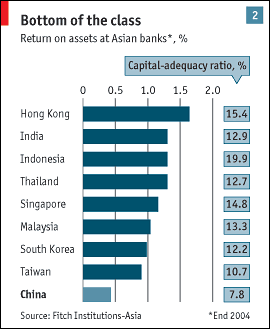
Another bank deal is the proposed purchase by Deutsche Bank AG and Sal. Oppenheim jr. & Cie. of a combined 14% stake in China’s Hua Xia Bank for € 272 million. This is the first major purchase of a stake in a Chinese bank by a German financial institution and further extends foreign participation in China’s financial system beyond the country’s top tier banks. The two German lenders will buy a total of 587.2 million shares from 18 Hua Xia shareholders; the deal will give Deutsche Bank a 9.9% stake in Hua Xia, while Sal. Oppenheim, Europe’s largest independent private bank, will have 4.1%. Fitch Ratings estimates that Deutsche Bank and Sal. Oppenheim paid 2.1 times book value for Hua Xia, higher than the 1.2 times book value that foreign investors have paid for minority stakes in Bank of China and CCB.
So far this year, foreign banks have spent $ 10.3 billion to acquire shares in Chinese banks, according to Dealogic. The major deals have swirled around China’s big four banks: Industrial & Commercial Bank of China, Bank of China, China Construction Bank and Agricultural Bank of China.
As these charts from the Economist show, a fundamental view of the banking
system is not reassuring.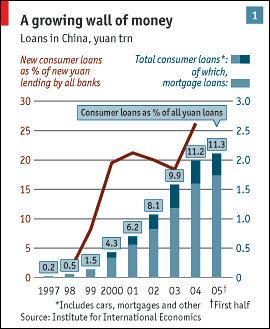 While business is good, consumer loans have increased by about 6x in 6
years, the bank system foundation appears shaky. If this is a bubble pumped
up by foreign banks and investors, the Chinese won't mind. Foreign money
will pay for the learning curve of the Chinese banking system when conditions
deteriorate. Caveat emptor.
While business is good, consumer loans have increased by about 6x in 6
years, the bank system foundation appears shaky. If this is a bubble pumped
up by foreign banks and investors, the Chinese won't mind. Foreign money
will pay for the learning curve of the Chinese banking system when conditions
deteriorate. Caveat emptor.
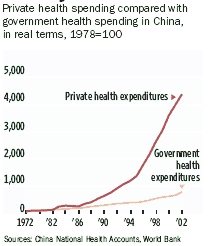 The
health sector may be more interesting to pursue. This chart shows how
spending on private health care is skyrocketing.
The
health sector may be more interesting to pursue. This chart shows how
spending on private health care is skyrocketing.
A host of reports emerged that suggested that India is becoming a more attractive investment destination than China.
In China, a widening income gap between town and country is worrying officials and will have implications for market analysis and development. But in India, the gap is narrowing and this is a virtuous circle which stimulates opportunities. A WBCSD reports that in 1990, for every $100 earned by an Indian villager, an urbanite made $82 more. Today, the difference has dropped to $56. Though in India, 390 million people still live on $1 a day or less. What is changing is the nature of the rich-poor divide. That divide was once synonymous with the urban-rural split. The only way to get rich was to live in town, and to reside in the country was to be bound to interminable poverty. But increasingly, the rural economy is a microcosm of the national economy, with its own rich and poor. The rural rich are 1,000 times as likely as the rural poor to own a motorcycle, 100 times as likely to own a color television and 25 times as likely to own a pressure cooker, according to a survey of 96,000 rural households by the research council. That distribution of wealth may or may not be equitable. But in creating the possibility of making it in rural India itself, the new rural prosperity is transforming rural India's image from economic nonentity to emerging market within the emerging market. India's 700 million villagers now account for the majority of consumer spending in the country, more than $100 billion a year. Millions step into consumerism each year, graduating from the economics of necessity to the economics of gratification, buying themselves motorcycles, televisions, transistor radios and pressure cookers. Diverse forces are fueling the trend. The government has invested billions of dollars in development, including road building and rural electrification, and has forced banks to lend to farmers. Good monsoons have helped farmers' profits. Widening educational access has helped farmers' children to get city jobs and send money home. With the private sector booming, industry and services have overtaken farming to account for 54 percent of rural income.
Also in India, Sanjiv Gupta, former Coca-Cola India CEO, and Kishore Biyani, founder of Indian retailer Pantaloon, reportedly are forming a private equity firm focused on the retail space suggesting that they see booming opportunities in this space. This contrasts with a deteriorating retail environment in Europe and the US.
Microfinance is an emerging niche which we believe exhibits an attractive risk/return profile. A well attended gathering, including Stanley Fischer and Kofi Annan, was sponsored by Cassin in October. Papers are available online here.
Responsible Investing
Enron Risk hit the headlines in October. Another telling tale of woe is the story of Refco, a New York-based independent futures brokerage, which typically posts over $1 billion in annual revenue and around $20 billion in managed assets, imploded in October. Refco chairman and CEO Phillip Bennett admitted to having hidden $430 million in debt owed to the company. The scam involved a holding company controlled by Bennett, and apparently had been going on since he took the reigns in 1998. Bennett has been arrested and charged with securities fraud. It is a sorry story because bad apples at the top of the barrel have caused distress for everyone in the group, as well as other stakeholders. (More from a VC perspective below.)
Another hedge fund debacle also hit the news in October with the SEC probe of Wood River Capital Mabagement. Caveat emptor.
Whole Foods has said it will open its first lifestyle store in late October on Santa Monica Boulevard, West Hollywood. The new store is likely to be smaller than its food stores (typically around 50,000 sq ft) and will offer products such as organic blue jeans, recycled handbags and environment-friendly paints and household products. The clothing offer is expected to include the Edun line by U2’s Bono. A selection of world music, sustainable living books and magazines will also be available. Neil Currie, a retail analyst with investment bank USB commented: "The opening of this store is interesting. It is showing that Whole Foods is thinking of ways it can build strong brand equity. It's a sensible approach and a low-risk way of the company testing out a new concept to move into new product categories.”
Wal-Mart CEO Lee Scott surprised company observers by embracing sustainability in a speech announcing ambitious initiatives on "all the issues that we've been dealing with historically from a defensive posture." The very fact Wal-Mart is addressing the issues it has so long avoided or short-shrifted - such as greenhouse gas emissions, waste reduction, product sourcing, healthcare, wages, and diversity - sends a loud signal to the market from one of the world's largest companies. Observers in the socially responsible investing (SRI) community welcome the potential changes while maintaining skepticism. "Wal-Mart's environmental goals - 100 percent renewable energy, zero waste, and sustainable products - are extremely ambitious but also very promising; merely aspiring toward the first two will have enormous ripple effects throughout their supply chain and reduce the strains that the company places on the public sector," said Shelley Alpern, director of social research and advocacy at Trillium Asset Management. "Obviously, what kinds of products constitute the third goal will be open to great debate, but the package-reduction goals will go a long way toward greening many product lines." Wal-Mart, the largest U.S. retailer, is joining the largest manufacturer, General Electric, in setting specific environmental goals while advertising those goals to shareholders, customers and the public as strategic business decisions. Goals include to invest $500 million in technologies that would reduce greenhouse gases from stores and distribution centers by 20 percent over the next seven years, increase the fuel efficiency of the truck fleet by 25 percent over the next three years and double it within a decade and design a new store that was at least 25 percent more energy-efficient within four years.
Socially responsible investing is showing signs of being memetic - in other words, spreading like a cultural virus. Specifically, traditional "mainstream" investors are starting to integrate social and environmental considerations into fundamental analysis of companies. Goldman Sachs for example, self-described as "one of the oldest and largest investment banking firms", recently issued a report to its clients entitled Global Energy: Sustainable Investing in the Energy Sector. GS inaugurated its own assessment of issues typically associated with SRI with its February 2004 launch of the Goldman Sachs Energy Environment and Social Index, assessing 30 social and environmental criteria in the global energy sector. It subsequently expanded coverage with its Environment, Social and Governance Index, increasing the number of criteria to 42 while adding a corporate governance category. "We believe that this template will be applicable across most industries because it captures the full spectrum of a company's interaction with the four key pillars: the economy; the industry in which it operates; society, from employees to partners, consumers, and counterparties; and the environment, in terms of resources consumed, emitted, and produced," states the report. "We believe excellence is a habit and that companies with superior environmental and social management are likely to be more successful in operating projects in the new world." The 164-page report demonstrates how GS applies its sustainable investing strategies to the global energy sector. The report finds GSEES leaders financially outperforming their peers by 12 percent since the index launch. It also finds strong financial performance by energy companies exposed to so-called "new legacy assets"--the largest oil and gas fields as defined by reserves that will drive the future of the industry over the next 20 years. Significantly, the report finds a strong correlation between strong ESG performance, exposure to new legacy assets (GS identified the top 50 such projects in June 2003 and the top 100 in January 2005), and financial performance. What distinguishes GS's methodology in this report from typical SRI approaches is the additional consideration of exposure to new legacy assets, while the ESG Index covers similar if not identical territory to most SRI research. The ESG Index ranks companies (based on information from their own disclosures) in five categories: environment, environmental and social management, social, corporate governance, and investment for the future. Interestingly, new legacy assets are not completely divorced from but rather intersect with ESG considerations. For example, the investment for the future category assesses community investment.
Venture Capital
Venture capital fund-raising slipped in Q3 2005. 714 companies raised $ 5.26 billion in the third quarter of 2005, according to the MoneyTree Survey by PricewaterhouseCoopers, Thomson Venture Economics and the National Venture Capital Association. Venture investment decreased from Q2 2005 of $ 6.07 billion, but surpassed Q1 2005 of $ 5.0 billion and Q3 2004 of $4.66 billion. For the first nine months of 2005, investing totaled $16.3 billion compared to $15.9 billion for the first nine months of 2004. Total venture capital investing in calendar 2005 could meet or exceed 2002's $21.7 billion which is the highest level in the prior three years. Over the past three years, investing has ranged from $4-$6 billion per quarter.
On the fund capital raising side, 45 U.S.-based VC firms closed on approximately $5.39 billion in fund capital during Q3 2005, which is the lowest tally since 54 such firms raised around $4.8 billion in Q3 2004. Second quarter 2005 numbers had been $6.49 billion for 53 firms, while year-to-date VC fund-raising stands at $17.37 billion for 130 funds. This last figure actually tops the entire 2004 total, which may discount a bit of prudence and discipline, given that this may be the richest VC fund-raising year since 2001.
The Refco debacle has hit major private equity firm
Thomas H. Lee Partners. In August 2004, TH Lee Partners
led a $2.25 billion leveraged buyout of Refco. The deal included just
over $500 million from TH Lee at around $8 per share. The IPO priced
at $22 per share in August 2005 (just above its $19-$21 offering range),
for a take of $583 million. TH Lee recouped around $170 million by selling
shares in the IPO, but remained Refco’s second-largest shareholder (behind
company management). Thomas H. Lee Partners is
losing around $1 billion in just three days. It may affect their current
fund raising as their due diligence was obviously weak in this case
(there may even be litigation), though their performance in general
is fine.
China is expected to relax capital-control
rules implemented earlier this year, in a move that could make it easier
for venture capitalists to invest in Chinese companies. The rule adjustment
is “to help domestic companies to make full use of the international
capital market, support the growth of the domestic high-technology industry
and venture-capital industry,” according to a draft of the new regulations.
The expected policy change comes amid a renewed push by Chinese leaders
to develop a domestic high-tech industry and amid a flood of new interest
by venture-capital firms in investing in Chinese technology and other
companies.
Investors in China are putting money into first-time
firms, first-time teams, and, in several cases, first-time VCs. Not
only are these VC firms abandoning the 30-minute rule (“We don't invest
in a company if we can't drive there in 30 minutes”), they're moving
into the risky territory of emerging managers. That should make the
next several years quite interesting.
India is overtaking China as the new hot spot for private equity investing. China is still expected to continue to absorb the lion’s share of Asian PE, but the benefits of India - including a robust stock market, an English legal system, English as the language of business and entrepreneurs with a lot of U.S. connections - are shifting at least some of the attention away from China.
A Financial Times story about IP theft in China in the semiconductor sector is an important reminder that the risk of illegal copying really has not changed since General Motors, Volkswagen, Cisco and others found parts they had designed in competing products from their Chinese sub-contractors. The fact that this story focuses on semiconductors should serve as a cautionary tale to VCs rushing to China.
At the recent LBO Symposium in Boston, Carlyle founder David Rubenstein made
the striking assertion that private equity capital has become
the
As a specialist in family business we were especially taken by the following editorial by Private Equity Week ...
FAMILY MATTERS by Adam Reinebach |
Expansion
Capital Partners has acquired an additional 20,000 common
shares of Biorem Inc., an
Bessemer Ventures has listed on its site some of the deals that it missed. Congratulations on their humanity.
Interest Rates and Currencies
We expect the federal funds rate to continue to rise to at least 5% within the next 6 months. US GDP and consumer spending both rose in the three months to 30 September, despite the hurricanes. The GDP rose by an annual rate of 3.8% during the quarter, and consumer spending increased by 3.9%.
In the US there has been much talk of inflation, however the general conclusion is that inflation is under control, but deflationary pressures may instead rise in the first half of next year. Prices are being pushed up, by interest rate rises, energy price rises and buoyancy in the housing market. But the underlying demand is not burgeoning and is under pressure. We expect stability in inflation and interest rates, but recognise that volatility risk is high. The spike in US house prices seems to be slowing but is well off historical trends which suggests a slowdown in demand is imminent. The weather and energy problems in the US may have curtailed short term enthusiasm. Hoisington Investment Management Company illustrate the tension with these two charts below. The first shows the spike in real house prices. The second shows the reliance on imported oil, which transaltes in to higher energy costs and lower demand for domestic production.
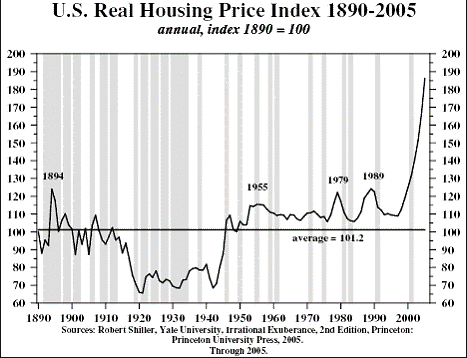
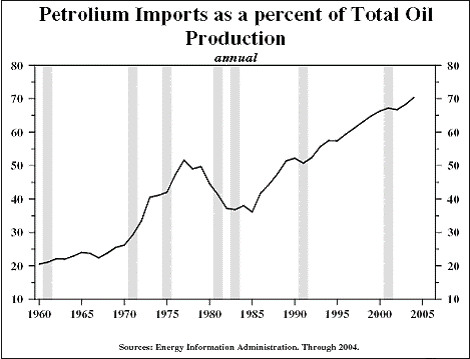
And inflationary pressures are global. This chart shows the massive spike that has been fuelled by war and weather change. This makes planning more challenging.
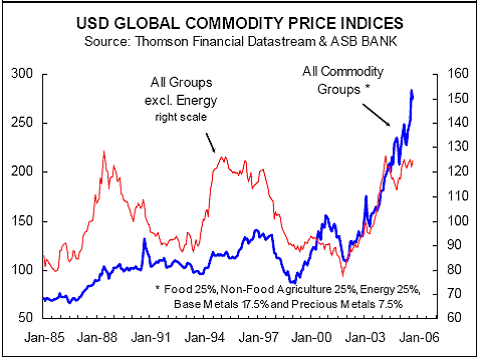
Trade and FDI
In an effort to revive stalled World Trade Organization talks, the EU and US have said they will cut controversial agricultural subsidies and tariffs. The US has said its reductions are dependent on similar action from the EU and Japan. The statements were made at a WTO meeting in Zurich which is leading to meetings in Hong Kong in December which aim to bring about a trade treaty by year-end. These proposals could see the key agricultural subsidies cut by 60% before 2010, with trade tariffs slashed by up to 90%. Trade tariffs would eventually be phased out completely, except on a limited number of "sensitive" products. Agricultural subsidies within the EU are on their way out. There is resistance, especially in areas like sugar, but they are uncomeptitive. "The abolition of the CAP is the only proper objective. There are no valid efficiency, security or fairness arguments for the continued protection and subsidisation of the agricultural sector." says Willem H. Buiter, Professor of European Political Economy, London School of Economics. If agreement on subsidy reduction is made, the Doha round of trade talks will be revived.
On the other hand, in related developments, the US has said it may retaliate against Brazil if it imposes sanctions in a cotton trade dispute. Brazil, which is at the forefront of efforts by the G20 group of developing nations to win more access to foreign market, had asked the World Trade Organization (WTO) for permission to impose $1 billion in penalties because the US has failed to meet a deadline for cutting its aid to US cotton farmers. In particular US cotton subsidies distort prices and harm competition by lowering export prices. The US could remove trade preferences which are worth more than $2 billion to Brazil. But even in the US Agriculture Secretary Mike Johanns has called for an overhaul of its system of subsidies for farming, saying that without such measures, the US would be unable to set out its own terms for access to world market.
Activities, Books and Gatherings
While making some minor website changes, I was delighted to find out that if you do a Yahoo search for "holonics" Astraea comes up on the second page, and if you do a search for "integral investing" GRI Equity is top of the list!
We put our first music video "Prince of Peace" by Galliano online. And hope more will follow.
The film version of Hitchhiker's Guide to the Galaxy is a brilliant story with many enlighted philosophies woven in. Worth viewing.
See the website http://www.northsoutheastwest.org/ for a dynamic look at climate change.
Pet lovers may enjoy http://www.canineportraits.org which is contributing funds to train a teacher in the US. Teach for America is the national organization of recent college graduates who commit to teach in public schools serving low-income rural and urban communities.
The International Spirit At Work highlights companies that have implemented explicit spiritual practices, policies or programs inside their organizations. For the past four years, ISAW has recognized 23 distinguished companies ranging from The Body Shop, to Times of India, and to the Australia and New Zealand Banking Group Ltd. The 2005 ceremony honours the nine new recipients of the award. The event showcases a number of inventive frameworks that the honorees used in implementing their spiritual value system into a results-oriented environment of business.
On November 7th, 9-10 PM Eastern there will be
a teleconference with Dee Hock, founder of VISA and author of One
from Many: VISA and the Rise of Chaordic Organizations. His work
is highly recommended. See details
of the conference here, or see the latest book
One from Many: VISA and the Rise of Chaordic Organizations
here.
This report has been prepared for information purposes and is not an offer, or an invitation or solicitation to make an offer to buy or sell any securities. This report has not been made with regard to the specific investment objectives, financial situation or the particular needs of any specific persons who may receive this report. It does not purport to be a complete description of the securities, markets or developments or any other material referred to herein. The information on which this report is based, has been obtained from publicly available sources and private sources which may have vested interests in the material referred to herein. Although GRI Equity and the distributors have no specific reasons for believing such information to be false, neither GRI Equity nor the distributors have independently verified such information and no representation or warranty is given that it is up-to-date, accurate and complete. GRI Equity, associates of GRI Equity, the distributors, and/or their affiliates and/or their directors, officers and employees may from time to time have a position in the securities mentioned in this report and may buy or sell securities described or recommended in this report. GRI Equity, associates of GRI Equity, the distributors, and/or their affiliates may provide investment banking services, or other services, for any company and/or affiliates or subsidiaries of such company whose securities are described or recommended in this report. Neither GRI Equity nor the distributors nor any of their affiliates and/or directors, officers and employees shall in any way be responsible or liable for any losses or damages whatsoever which any person may suffer or incur as a result of acting or otherwise relying upon anything stated or inferred in or omitted from this report.